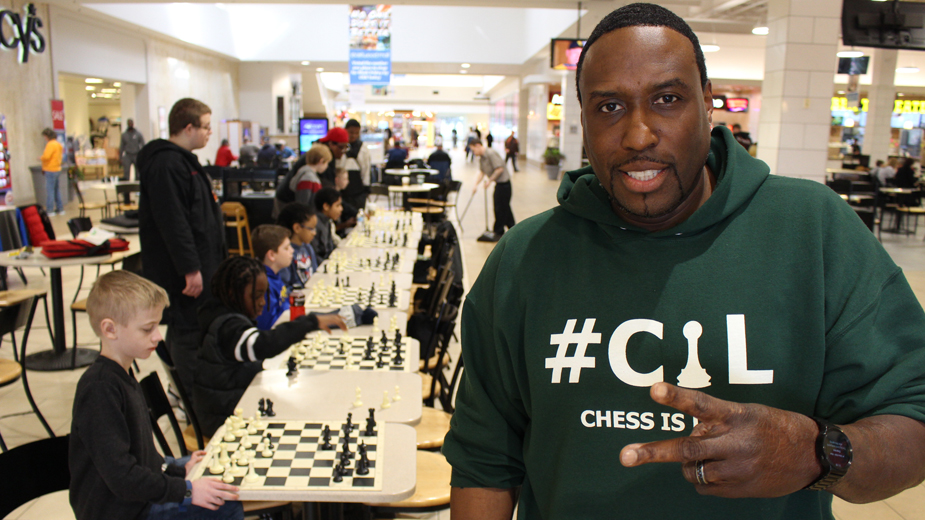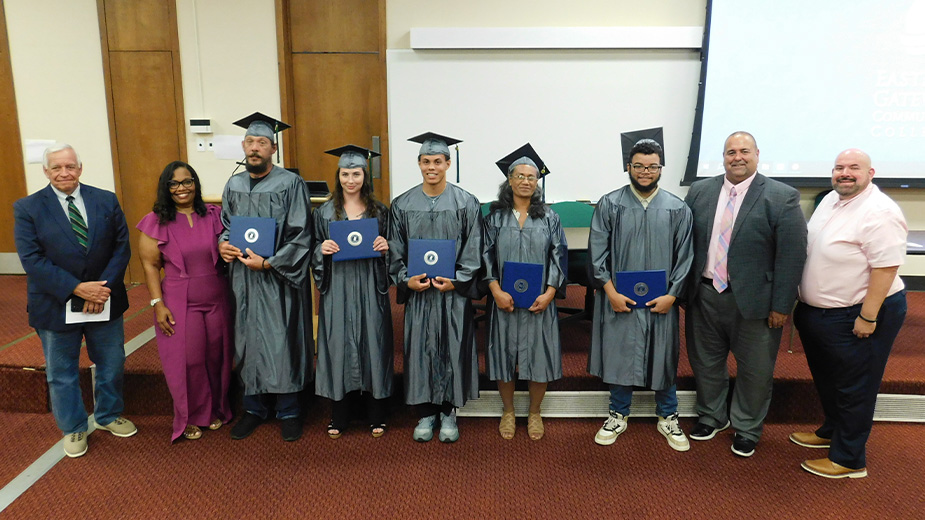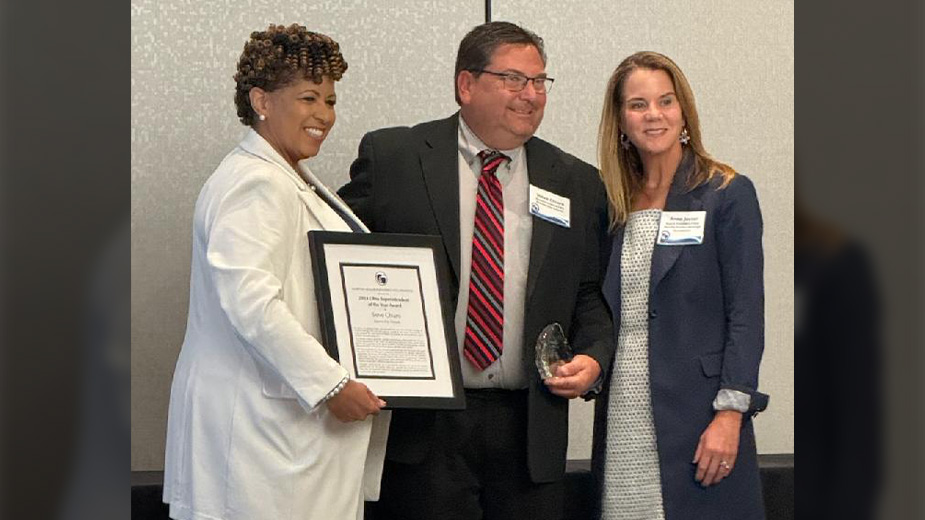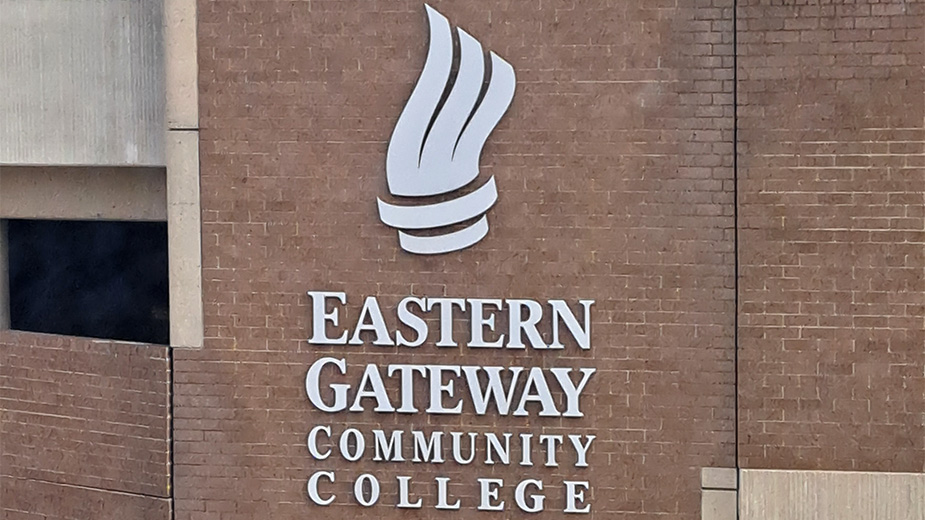‘Chess Is Life’ Puts Future in Check with Life Lessons
NILES, Ohio — At 10 o’clock on a Saturday morning, Eastwood Mall starts to fill with walkers and shoppers.
As the people make their way beyond the food court, some turn their heads instead of watching where they’re going. Others give in to curiosity and come to a full stop to get a better look at the loud, animated man playing chess with seven children.
“Stay focused,” says Jeffrey “Coach Jeff” Butts to one of the kids, even as he contemplates his next chess move.
Each child sits in front of a chessboard, waiting for Butts to make his move. When he does, other more experienced players crowd around to offer advice while Butts moves to the next child.
“Am I playing a good game?” one child asks.
“Yes, you are,” Butts replies, before he promptly captures one of the child’s pieces.
But the goal isn’t just to teach the kids how to play chess. It’s to teach them how to play – and ultimately win – the game of life.
“Everything in life is a game,” says Butts, co-founder of Chess Is Life. “Not fun and games, but you’re always thinking about your next move. You’re always thinking about what the next step is.”
Butts says Chess Is Life has the same letters as the capital letter in each of these words: Cognitive, High-level Enhancement of Successful Strategies, Inspiring Students in Long-term Intrinsic Focus on the End-game. The program is taught by volunteers who aim to teach young people about life through playing chess.
“You have to focus on your endgame in education, in business and in life,” Butts says.
The group meets in the mall food court every Saturday from 8:30 a.m. to noon. Elisha Ballinger, a fifth-grader at Potential Development in Youngstown, has been playing chess for three years.
“I like chess because it keeps your mind right and it’s just fun,” he says.
Ballinger, whose father is a coach with Chess Is Life, says unlike chess, there are no do-overs in life.
“You cannot do bad things in life and think that nothing’s going to happen. Because it is,” he says. “I want to be a great person when I grow up. That’s why I’m trying to play chess. You have to always think before you speak. You have to make sure you say the right thing.”
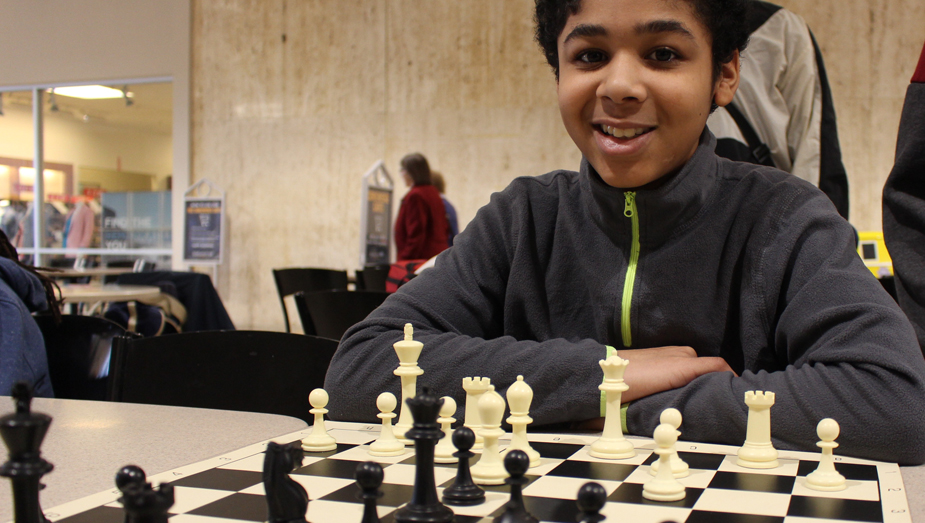
One student having some success against Butts this day is Colin Paisley.
“You took my piece? Good stuff,” Butts tells him upon returning to their game.
Paisley’s grandmother, Patti Ciferno, brings him nearly every Saturday. “He loves the competition and he loves the learning,” she says. “And all during the chess game [Butts is] teaching them values and skills that they’re going to need as they go through life.”
Butts took up chess in the 11th grade when he noticed two boys playing during study hall. He was immediately hooked. “I can’t remember their names, but I fell in love with that game watching them,” he says.
A self-diagnosed victim of an overactive mind, Butts turns to chess to help himself calm down and take life one task at a time. “My mind just never sleeps,” he says. “Silence is not silent to me.”
Although he’s never read a book on chess or played in a tournament, he says he’s been obsessed with the game for nearly 30 years. “Chess is intricate,” he says. ”It’s complex.”
Butts spent years teaching his wife and children the game, as well as his nieces and nephews, all while developing the Chess Is Life concept. But it was a chance encounter that took Chess Is Life from a concept to reality.
In 2011, Butts ran into Myles Jay at a football game at Mollenkopf Stadium in Warren. Butts knew Jay as a child from church. Now, years later, Jay was a young man who also had a passion for chess.
“‘I’ll checkmate him in four. I’ll checkmate him in two,’ ” Butts recalls Jay saying in the stands as people looked on.
“I looked him right in his eyes and said, ‘Young man, you shouldn’t talk all of that noise to somebody who carries a chess board in their trunk.’ So everybody around goes, ‘Oooooh!’ ” Butts says, although he admits he was unprepared for Jay’s response: “What are you trying to say? I carry a chess board in my trunk too.”
Once again, a loud “Ooooooh!” rose up from the people around them.
Butts retrieved the board from his car and the two played in the bleachers during the game, although neither Jay nor Butts is willing to take the story any further.
“If you focus on winning, you’re not focused on what got you there,” Butts explains. “It’s the same thing in life. It’s the substance of what we need to learn to get to that victory that really matters.”
The two played regularly, first in Panera Bread on Elm Road, then at the Mocha House in Warren, but Jay wanted to take the game somewhere with more visibility. So in 2012, they took it to the food court. Chess Is Life grew from there.
“Every Saturday we’re here at the Eastwood Mall. It’s dependable. You can come see us,” says Jay, co-founder. “We want to continue to develop and grow that momentum we have now.”
Volunteers for Chess Is Life take their message to nearly 30 sites, mostly area schools, although they also reach kids in Cleveland, as well as those at the Juvenile Justice Center and the Northeast Ohio Community Alternative Program.
“The real thing that intrigues me about chess is when you sit down with somebody, it doesn’t matter what you look like or your age,” Jay says. “You can sit down with a 70-year-old man who’s been playing chess his whole life, and you’re 15, and you could whoop him.”
Two years ago, Chess Is Life partnered with the United Way of Youngstown and Mahoning Valley to integrate its program into Success After 6, which provides after-school programming to students in the Youngstown, Campbell, Girard and Liberty school districts, as well as Youngstown Community School.
“One component of our programming focuses on positive-youth development, and that’s really where they fit in,” says Amy Klingensmith, director of Success After 6. “They teach everything from manners to respect to working together.”
How to deal with problems is another lesson.
“I tell the kids I have a really big mouth but I can’t eat a steak whole,” Butts says. “They start laughing, but it’s true. So how do you eat a steak? One bite at a time. That’s how you solve problems.”
Success After 6 runs from October to early May. During that time, volunteers in Chess Is Life visit each school at least once weekly.
“They are putting a lot of miles on their cars. Coach Jeff might be at two schools a day,” Klingensmith says.
Many of the kids they meet don’t know how to play chess, Butts says, and those who do don’t fully understand the game.
“We call it playing ‘hope chess.’ You move and then you hope your opponent helps better your position,” which is no way to play chess or live life, Butts says. “Do you really want somebody else dictating to you the way you move?”
Butts displays a great passion for his work, because he feels Chess Is Life is his purpose. Years ago, while recovering from an accident that nearly killed him at the former CSC Ltd./Copperweld Steel plant in Champion Township, he sought advice from his pastor.
“I was crying in my room and I said, ‘I don’t know why I’m still here. There has to be a reason. I feel like I need to save the world,’ ” he says. “He looked at me and said, ‘Son, one at a time.’ ”
Pictured at top: Jeffrey Butts leads chess matches at the Eastwood Mall every Saturday morning.
Copyright 2024 The Business Journal, Youngstown, Ohio.
